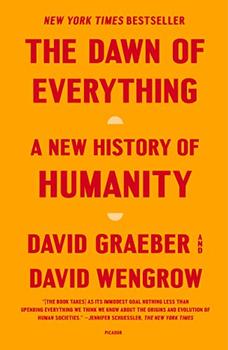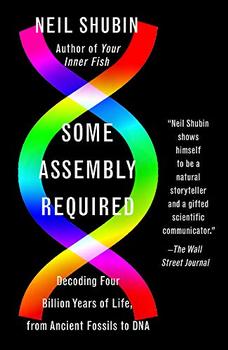Summary | Excerpt | Reading Guide | Reviews | Beyond the book | Read-Alikes | Genres & Themes | Author Bio

A Brief History of Humankind
by Yuval Noah HarariAuthor Yuval Noah Harahi defines the word "human" as "an animal belonging to the genus Homo." If we look to Oxford Dictionaries, on the other hand, we discover that human is defined as "relating to or characteristic of humankind." While both are equally correct, there is a wealth of difference between the two. The first rather sterile, scientific denotation entirely lacks the depth of the latter, which is a broader, more subliminally sentient interpretation that hints at some of our deeper, intangible attributes - our thoughts, emotions, hopes and dreams. The gulf between one and the other bears witness to an incredible, 150,000-year evolutionary journey from the emergence of our species in Africa, "the cradle of humanity," to our present-day, post-imperial, globalized world. It is precisely this journey, this leap from merely human to humankind, that Harahi chronicles in this remarkable book.
Sapiens: A Brief History of Humankind is an ambitious undertaking by anyone's standards. One hundred and fifty thousand years is an extremely long time - the very opposite of "brief," in fact. As centuries gave way to millennia, the development of our species was slowly and incrementally shaped by three major "revolutions": the Cognitive Revolution, which saw the emergence of language and our ability to believe in collective invented "realities" like the concept of gods and, later, money; the Agricultural Revolution, which ushered in large-scale domestication of animals leading to a switch from a hunter-gatherer lifestyle to that of farmer; and, more recently, the Scientific Revolution, during which humanity set about deciphering the mysteries of the world.
The ability to cooperate and collaborate with each other on a large scale was, as we discover during the course of Sapiens, crucial to the success of our species. Fittingly, it is also key to the ultimate triumph of this book, which is nothing if not a collaborative engagement with the innumerable scientists, philosophers, radical thinkers and scholars who have gone before. By drawing on the vast wealth of knowledge unearthed by others down through the ages, in disciplines as diverse as paleontology, archaeology, anthropology, psychology, philosophy, sociology, and religion, Harahi presents a staggeringly comprehensive account of the vast human story. (Incidentally, he offers a popular free online course on the same subject).
That the author is undoubtedly standing on the shoulders of giants is not, however, to suggest that this book is in any way derivative. While Sapiens: A Brief History of Humankind wouldn't be possible without the innovations and discoveries of our predecessors, it is also a book which proves that it is not beyond the abilities of one man to distill such a huge expanse of history into a single articulate and highly readable volume, even if such a process at times necessarily lends itself to sweeping generalization and a certain oversimplification of statement. When discussing the Atlantic slave trade, for instance, Harahi states that the practice "did not stem from racist hatred towards Africans," but rather from "cold indifference and greed." While this is in part true, it cannot be denied that Africans were in fact viewed by some as a lower class of human, so racism arguably was a factor to some extent.
Harahi's fierce, almost iconoclastic independence of mind is very much in evidence. He is not afraid to put forward his own interesting — if sometimes overly radical — theories about our past and our possible future. By debunking some deeply held evolutionary myths, he makes us question everything we thought we knew about the human story. One of the most notable of these myths is the misconception of linear human evolution. Contrary to popular belief, there was no "straight line of descent" from, for example, homo erectus to Neanderthals to homo sapiens. As Harahi points out, several species of humans once co-existed on the planet - sapiens alone have survived to the present day by virtue of being the most successful, the "fittest" if you will.
There are many books that can justifiably claim to have, in one way or another, changed the world. The laws of motion contained in Isaac Newton's Principia Mathematica heralded a sea change in our understanding of physics and mechanics. Charles Darwin's theories of evolution outlined in On the Origin of Species were so groundbreaking, the book sparked debate in almost every sphere - scientific, religious, social and political - of the Anglophone world. Adam Smith's The Wealth of Nations and Karl Marx's Das Kapital had similar impacts in the arena of political and economic theory. While not as obviously trailblazing as the work of some of these giants, Sapiens: A Brief History of Humankind is, in its own quiet way, just as innovative and thought-provoking.
![]() This review was originally published in The BookBrowse Review in March 2015, and has been updated for the
May 2018 edition.
Click here to go to this issue.
This review was originally published in The BookBrowse Review in March 2015, and has been updated for the
May 2018 edition.
Click here to go to this issue.

If you liked Sapiens, try these:

by David Graeber, David Wengrow
Published 2023
A dramatically new understanding of human history, challenging our most fundamental assumptions about social evolution―from the development of agriculture and cities to the origins of the state, democracy, and inequality―and revealing new possibilities for human emancipation.

by Neil Shubin
Published 2021
The author of the best-selling Your Inner Fish gives us a lively and accessible account of the great transformations in the history of life on Earth--a new view of the evolution of human and animal life that explains how the incredible diversity of life on our planet came to be.
Your guide toexceptional books
BookBrowse seeks out and recommends the best in contemporary fiction and nonfiction—books that not only engage and entertain but also deepen our understanding of ourselves and the world around us.